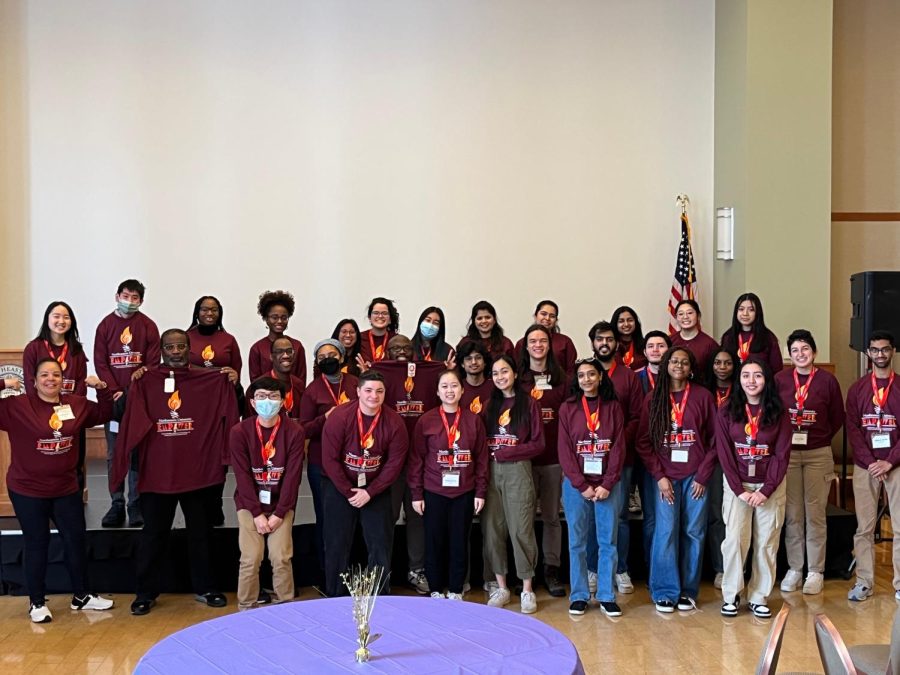EMPOWER debuts new theme, ‘Ignite,’ for 2023 Student of Color Conference
Members of the EMPOWER Collective pose for a group photo during the 2023 Student of Color Conference. The collective was started 12 years ago by students of color who felt they were underrepresented by SGA. Photo courtesy Dani Rodriguez
March 27, 2023
The EMPOWER Students of Color Collective launched a new theme this year for its annual conference aiming to create a safe and empowering space for students of color. With a focus on community building and social consciousness, the program was designed to ignite leadership skills and inspire change within the student body.
Under the theme of “Ignite,” the collective organized a series of workshops and events March 18 centered around the experiences of students of color, with the goal of sparking a flame of activism and empowerment that will shine brightly in their communities.
The conference began with Northeastern’s Dean of Cultural and Spiritual Life Bob Jose briefing the audience on the history of EMPOWER.
“[EMPOWER] really started about 12 years ago because of an issue that had come about and [was] raised by students of color,” Jose said. “They did not feel that they were being adequately represented by SGA. There was a very large and very loud meeting, in what is now the Center for Intercultural Engagement … the room was packed [and] made their issues known to SGA leadership.”

Jose stated that shortly after that meeting, he and the director of the Asian American Center at the time determined they had to create a platform where students of color could learn and understand the resources available to them. He also emphasized that EMPOWER is a platform where different centers can connect together.
“It was a way of networking, so that Black students can meet Asian students; Asian students can meet Latin students; Latin students can meet Muslim students … and you won’t necessarily get that in your center. But this is a collaborative effort between all the centers,” Jose said.
Kya Martine, a confidential resource advisor in the Office of Prevention and Education at Northeastern and the keynote speaker at the EMPOWER conference, introduced the term “accountable space” to people in attendance. Martine understands the phrase “what is safe today might not be safe tomorrow” and said she wanted this EMPOWER conference to be a space where everyone felt safe to tell stories. During her keynote speech, Marine expressed that being a person of color and a woman of color made her contribute and push herself more.
“We don’t get to be who we are,” Martine said of people of color. She believes passion is the virtue that keeps her driven.
The conference had 11 workshops in total. One of the workshops focused on intersectionality and how the interaction of certain identities affects the way certain communities navigate society. A second workshop aimed to address a shared experience amongst many students of color: imposter syndrome. Another workshop raised awareness about implicit bias and microaggressions, discussing strategies to tackle the latter.
Vy-Le Thao, a third-year bioengineering major who attended the conference, said she came to the EMPOWER event because of its opportunities to meet students and staff members outside of the Asian American Center. Thao felt that EMPOWER allowed a unique space for students of color and community leaders to interact with each other.
“Because the Asian American Center is the community that I interact with the most, I just wanted to learn more about other programs and interact with other circles,” Thao said. “It’s also an opportunity for us to connect and share about our experiences and learn about other people’s experiences in a way that you don’t usually do.”
In the afternoon, the first workshop explored ideas of care from Deanna Zandt’s mini-comic “The Unspoken Complexity of Self-Care.” Participants identified and celebrated some of the skills that earned them admission to an elite institution while discussing techniques on how to best leverage them in higher education at another session. Lastly, the “Music that Moves Us” workshop allowed participants to curate a playlist that expressed themselves and connected them to their cultural backgrounds.
Dani Rodriguez, the assistant director for the Social Justice Resource Center as well as the Empower Planning Committee, emphasized the importance of education at the conference to ignite students’ social consciousness.
“When you leave the conference, you will hopefully take some hard skills and some soft skills with you in terms of how to address a particular issue that a lot of students of color might face … but we also make sure every year that some of our workshops are also just a space for students of color to heal,” Rodriguez said.

Sara Rivera, the associate director at the Latinx Student Culture Center and a member of the EMPOWER committee, emphasized how she likes being able to engage with students of color, but also help them make connections with each other and the staff.
“I feel a sense of pride,” Rivera said. “Because they have faith and confidence in my ability to help them, but also even for them to have the courage to reach out to somebody that they may not otherwise know.”
Looking forward to next year’s conference, Jose said the EMPOWER summit will transform in whichever way students want it to change.
“This is really student driven … students will tell us, what’s the awareness they need, what’s the knowledge they need, what’s the skills they need?” he said. “We listen to the fellows, and we get feedback from the people here.”


















